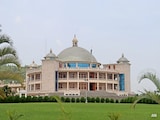A thick layer of smog covered Delhi and its adjoining areas this morning as pollution levels slipped to "severe" category again after a marginal improvement on Wednesday.
Delhi's air quality index or AQI stands at 426 as a result of farm fires in the neighbouring states and vehicular emissions. Unfavourable meteorological conditions have also contributed to pollution in the national capital.
The air quality index (AQI) between 401 and 500 is categorised as severe, the worst band on the index.
As Delhi is forced to breathe the toxic air, several residents have reported breathing difficulties, with the elderly and schoolchildren being the worst hit.
Medical experts say prolonged exposure to toxic air, especially during the morning, can lead to serious health problems.
A leading private school, The Shri Ram School, has suspended physical classes at its branches in Delhi and Haryana for tomorrow in view of the deteriorating air quality. The school will be conducting online classes tomorrow.
The physical classes will resume on campus from Monday and N95 masks will be mandatory for both students and the staff, the school said.
Sources say more schools may do the same. This comes a day after the National Commission for Protection of Child Rights urged Delhi Chief Minister Arvind Kejriwal to shut schools till air quality improves.
Parents, however, say the authorities should adopt long-term measures to tackle city's rising pollution instead of shutting schools. "Closing schools is not a solution, the government should do something to tackle pollution," a woman told NDTV.
"Our children are struggling to breathe, but the government should not shut the schools. They should take steps to improve the air quality. The kids already suffered when the schools were shut during the pandemic," another parent said.
The 24-hour AQI of the city stood at 376 yesterday, improving from 424 on Tuesday.
The AQI between 401 and 500 is categorized as severe, the worst band on the index. An AQI between zero and 50 is considered "good", 51 and 100 "satisfactory", 101 and 200 "moderate", 201 and 300 "poor", 301 and 400 "very poor".
Experts say the air quality in Delhi is worst between November 1 and November 15 because the stubble burning is at peak during this period.
Smoke from farm fires contributed to up to 38 per cent of the tiny PM 2.5 lung-damaging pollutants in the city's air - the highest in the past two years during the period of mid-October to early November, according to data from the Ministry of Earth Science.
PM 2.5 are fine particles that are 2.5 microns or less in diameter and can travel deep into the respiratory tract, reaching the lungs and entering the bloodstream.















